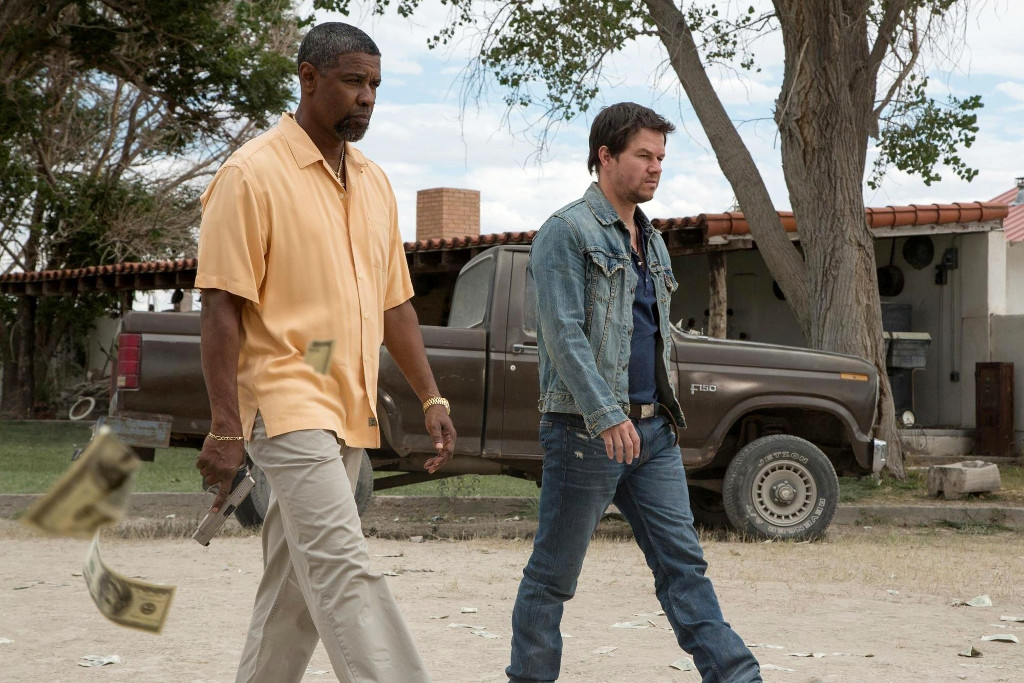2 Guns, Lethal Weapon, And A Brief History Of The Interracial Buddy Cop Film
The more things change, the more they stay the same.

In 2 Guns, their new “action comedy drama thriller film“, Denzel Washington and Mark Wahlberg play a couple of hired hands who do their best to bring down a Mexican drug cartel. Unfortunately, both men are undercover, each unaware of his partner’s ‘legit’ identity. Pitching the DEA (Washington as Robert ‘Bobby Beans’ Trench) against Navy Intel (Wahlberg as Michael ‘Stig’ Stigman), and throwing the CIA (Bill Paxton) in for good measure, 2 Guns successfully creates an explosion-laced shoot ‘em up critique of the various US official authorities.
In suggesting that each faction’s competing petty narratives only further contribute to social anarchy, the film posits the true gangsters as those who govern and therefore control crime. Outside this admirable (if over-the-top) attempt to shame the system, 2 Guns also adheres to the formula for interracial buddy movies that spurred franchises and enjoyed commercial success in the ’80s and ’90s. Filled with quick-witted quips and characters fighting for mutual respect while also fighting crime, 2 Guns adds some millennial bling to the genre, repackaging the old-school formula for today’s excess-saturated cinema, but here are five films that paved its way…
–
48 Hrs. (1982)
It all started with Eddie Murphy. A true breakout comedian of the time, Murphy brought racial issues into the mainstream through his humble-with-a-sting humour. Setting Murphy’s fly-talking, jive-walking, criminal “bad-ass black guy” stereotype against Nick Nolte’s gruff-talking, on-the-nose, “calculated cop”, 48 Hrs. created a new template for the mismatched buddy action-comedy flick.
Looking back at the film now, there might be a retrospective temptation to read it as a high-concept minstrel routine. But Murphy has always been a man who knew what he was doing, and his performance is a layered ‘making fun of the white guy making fun of the black guy’ routine. In fact, you’d do better picking it apart for its homophobia than its racism. Still, what 48 Hrs. achieved was starting the conversation.
–
Beverly Hills Cop (1984)
By 1984, Eddie Murphy was fast becoming one of the hottest names in comedy. In fact, he was so successful that he no longer required a top-billing white man to star alongside him. Featuring an ensemble, supporting cast that included the likes of Judge Reinhold, Murphy’s not quite by the book character Axel Foley was another step forward. Not only was the black man the star, but he’d burst into the white man’s world (from Detroit to Beverly Hills) and forced everyone to pay attention.
The film was an instant success and became a franchise with three sequels running into the early ’90s. And it’s not over yet: Beverly Hills Cop 4 is currently “in development”, with Murphy signed on as producer.
–
Running Scared (1986)
A couple of years later, Billy Crystal and Gregory Hines teamed up in Running Scared, as two street-wise cops who’ve had enough. Their antics aren’t always above-board and their results aren’t always effective, but they are — for the most part — on equal footing. However, the one major uneven narrative device is the forty thousand dollar inheritance that Danny (Crystal) receives notice of early in the film. Neatly acknowledging that history has traditionally favoured the white man and that its trickle-down effect is still felt, Running Scared plays its cards face-up.
–
Lethal Weapon (1987)
In its attempt to flip the stereotypes, Lethal Weapon was a great success, positing the black man (Danny Glover) as the trustworthy partner with stability — a wife, children, and an upper middle-class home — and the white man (Mel Gibson) as the one with a troubled background and devil-may-care attitude. The deliberate reversal of Hollywood’s usual racial stereotypes suggests this film is more progressive than its predecessors, although there are arguments to be made for and against. Regardless, director Richard Donner was clearly onto a winning formula as he went on to make three more Lethal Weapon movies, with Lethal Weapon 4 released in 1998.
–
National Security (2003)
The new millennium brought with it a refreshing (well, or irritating, depending on your tolerance levels) indulgence in self-reflexivity, and National Security was the racial buddy cop film that embraced this new trend. With its premise set around a black man who entraps a white cop into unjust incarceration by embellishing an awkward incident into a racial beating, National Security pulls its punches. Allowing its audience to read it first as back-handed racism, absolving the white man of his sins due to black man’s trickery, it then smacks its audience in the face with a self-aware parable: the white man must experience the injustice bestowed upon the black man in order to truly understand his plight.
From 48 Hrs. to 2 Guns, the way Hollywood approaches the genre appears to be changing. But when it comes down to it, despite its system blaming, 2 Guns‘ Bobby Beans, though clearly smarter than his ‘partner’ Stig, still has to learn morality from the white man. The more things change, the more they stay the same.
–
2 Guns is currently showing in cinemas nationally.
–
Tara Judah is a Melbourne based film writer and radio critic. Her outlets include Metro Magazine, Screen Education, Overland, JOYFM and The Big Issue. She also co-hosts a film criticism podcast on Triple R. Her Twitter is @midnightmovies.